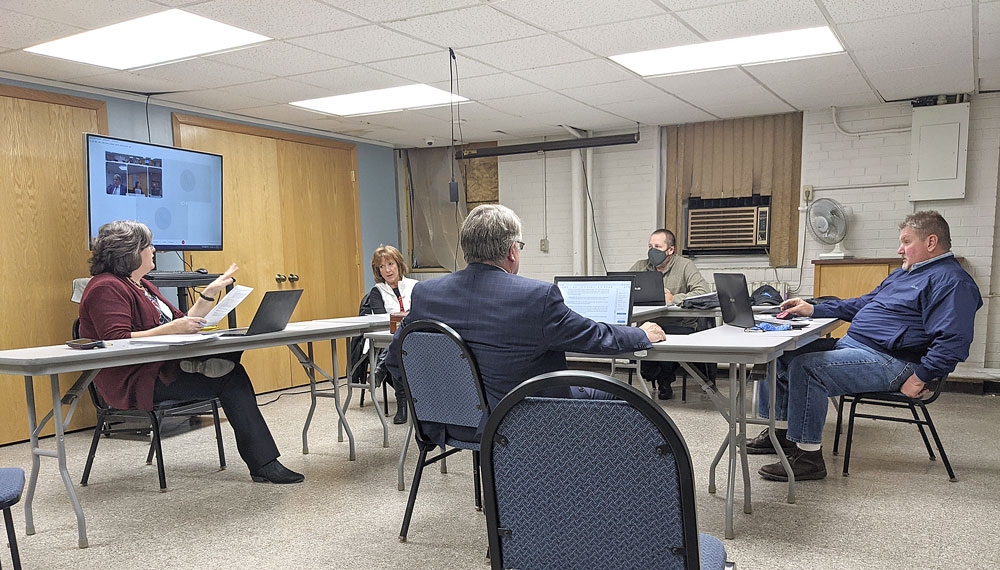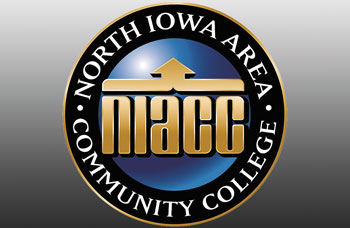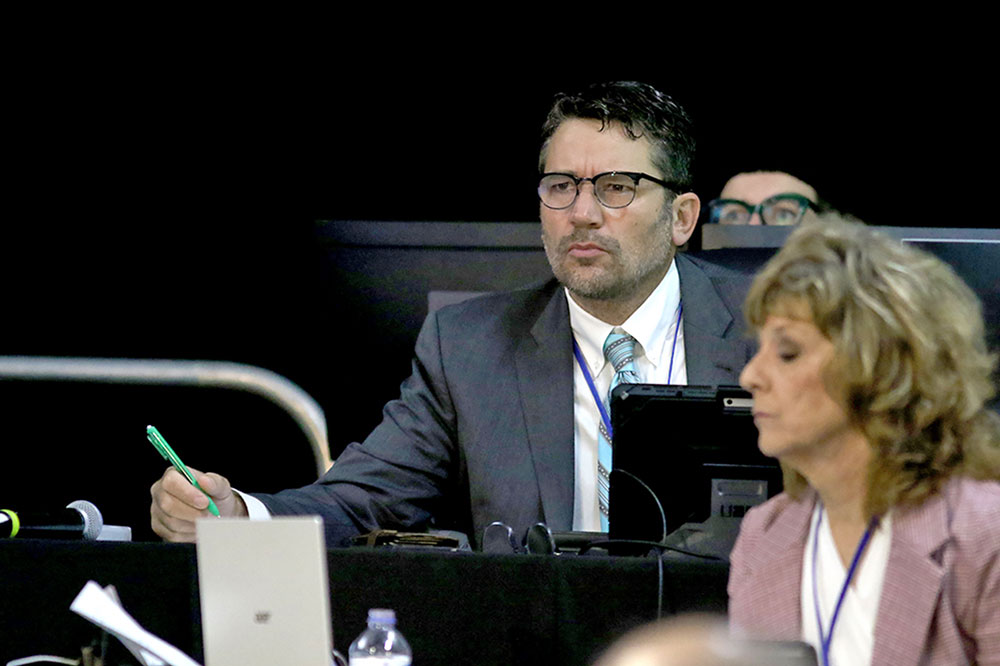Iowa board says Floyd County supervisors COVID-19 agenda item not specific enough

By Bob Steenson, bsteenson@charlescitypress.com
A state agency has tabled an Iowa Open Meetings Law complaint filed by a former county supervisor against the current Floyd County board, with the hope that the current board can improve the transparency on its meeting agendas regarding action on COVID-19 issues.
Mark Kuhn, who was a Floyd County supervisor from 1993 to 1998, a state legislator from 1999 to 2010, and a supervisor again from 2011 to 2018, had filed the complaint in December with the Iowa Public Information Board (IPIB).
He alleged that the current Board of Supervisors’ practice of listing “Review/Action regarding coronavirus (COVID-19) issues as applicable” on just about every regular meeting agenda does not meet state requirements.
The IPIB executive director had recommended that the state board dismiss Kuhn’s complaint as “legally insufficient,” but by an 8-1 vote at the meeting held Thursday afternoon, the board tabled that recommendation and told the IPIB staff to go back to the Floyd County supervisors to “help improve their agendas.”
The Iowa Open Meetings Law requires government bodies to publish an agenda at least 24 hours in advance of public meetings, and to specifically list the items that will be discussed or acted upon during that meeting.
Kuhn had argued that using the same COVID-19 line item for every meeting failed to tell the public what the board would be specifically discussing regarding that topic.
Kuhn filed the complaint after, at a Dec. 8 regular board meeting, the supervisors considered a motion by then-Chair Roy Schwickerath to require face masks in the Floyd County courthouse. That motion died for a lack of a second from either other supervisor, but the board did go on to approve making changes to COVID-19-related policies and in a COVID-19 public screening form.
Kuhn argued that the actions were illegal under the Iowa Open Meetings Law agenda requirements, and were especially egregious because he had raised the issue at a workshop meeting the previous day that the agenda item was insufficiently detailed.
Kuhn told the members of the IPIB at its Thursday electronic meeting that members of the public who read the posted agenda for the supervisors’ regular meeting Dec. 8 would have had no way of knowing the board was going to be discussing something as important as a mask mandate for the courthouse.
Kuhn noted that the Floyd County assistant attorney, Randy Tilton, had said when asked about it the afternoon before the Dec. 8 meeting, that an item that affected as many people as a courthouse mask mandate should be listed specifically on the agenda.
Tilton also said in an email message that the other two items, regarding a COVID-19 policy and the public screening form, were changes to already existing policies and affected few enough people that they could legally be covered under the generic COVID-19 agenda language.
At the Dec. 8 meeting, Schwickerath had said that Tilton’s opinion was not the law and not “set in stone,” and the supervisors had to decide if they were comfortable with the agenda language. All three agreed they were.
Dustin Zeschke, a Waterloo attorney representing the Board of Supervisors through their insurance company, had written to the IPIB in response to Kuhn’s complaint. He wrote that the Iowa Supreme Court had ruled that the question regarding an agenda item is not whether it was perfect, “but whether the notice sufficiently apprised the public and gave full opportunity for public knowledge and participation.”
IPIB Executive Director Margaret Johnson, a paid staff member to the IPIB board, had recommended that Kuhn’s complaint be dismissed, saying in her written recommendation that “an agenda item entitled ‘Review/Action (regarding) coronavirus (COVID-19) issues as applicable,’ could reasonably be understood to include issues such as masks and signage related to coronavirus protection.”
But several IPIB board members disagreed with that conclusion. Board members E.J. Giovannetti of Urbandale, Barry Lindahl of Dubuque, Keith Luchtel of Clive, Monica McHugh of Zwingle, Rick Morain of Jefferson, and Susan Stewart of Sioux City all said that the agenda item should have been more specific.
Several of those said they didn’t think it went as far as breaking the law, but Morain, a former newspaper publisher, said, “I’m going to come down on the side of that it should have been more information. The Iowa law says in cases of ambiguity you decide for openness. I think in this case openness would have been to have more description.”
Luchtel said, “The public had no way of knowing that it (a mask mandate) might be discussed. I think it should have been on the agenda.”
Randy Evans, the executive director of the Iowa Freedom of Information Council, spoke in support of Kuhn’s complaint.
“The agenda provides no guidance for the public whether this discussion at the supervisors’ meeting is one that they have any interest in at all, because of the fact that the same agenda item has been used for six or seven months,” he said. “To me it falls into what the IPIB’s own Q&A guidance says, that agendas need to be more informative than using catchall phrases like old business or new business.
“An agenda item that is the same for 30-plus meetings certainly falls into the catch-all category. The public doesn’t know when the agenda item says COVID issues whether it’s dealing with testing or vaccines or where vaccines are going to be available, hours at the courthouse, whether the courthouse is going to be open or closed. There is such a multitude of issues,” Evans said.
“The Iowa Attorney General’s Office in 2002 issued a sunshine advisory in which it said governments need to provide sufficient notice to inform the public of specific actions that were going to be taken or specific matters that were going to be discussed. It seems to me that the Floyd County agenda fails to do that,” Evans said.
Luchtel said he didn’t want to go as far as to raise Kuhn’s complaint to the level of IPIB officially contesting the supervisors’ actions, but he wanted to “move to a position that the proper notice was not given to the public on an important issue.”
“We’re not taking action today, but we’re taking another look at it, in which case our procedures call for some informal contacts and so on,” Luchtel said. “Perhaps there could be a change of mind. I don’t think it’s a thing where we would want to go to a contested case on, but I think they really did miss the boat here, and that’s getting more information on their agenda.”
The IPIB board voted 8-1 to table the dismissal recommendation and instruct the IPIB staff to get in touch with the Floyd County Board of Supervisors and relay the board’s opinion that the COVID-19 agenda item needs to be more informative and work with the board to improve its agenda process.
Board member McHugh was the lone no vote, but she did not comment why she had voted that way.
The Iowa Public Information Board was created by the Legislature in 2012 to provide an alternative to the court system to enforce the Iowa Open Meetings Law (Chapter 21) and the Iowa Open Records Law (Chapter 22) in an “efficient, informal, and cost-effective process for resolving disputes.”
It is a nine-member board appointed by the governor, consisting of representatives of media, government and the public, plus an attorney employed as the executive director. It has the authority to prosecute a government body or public official in a contested case if a dispute can’t be resolved informally.








Social Share